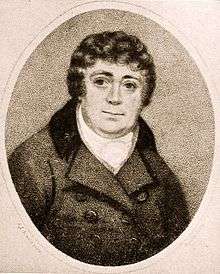Samuel Arnold (composer)
Samuel Arnold (10 August 1740 – 22 October 1802) was an English composer and organist.

Arnold was born in London (his mother is said to have been Princess Amelia; his father was Thomas Arnold.[1][2] He began writing music for the theatre in about 1764. A few years later he became director of music at the Marylebone Gardens, for which much of his popular music was written. In 1777 he went to work for George Colman the Elder at the Little Theatre, Haymarket. In 1783 he became organist at the Chapel Royal, and in 1793 he became organist at Westminster Abbey, where he was eventually buried.
Works
Arnold's best-known works include:
.jpg)
- The Maid of the Mill (1765)
- Abimelech (1768)
- The Prodigal Son (1773)
- Incidental music for Macbeth (1778)
- The Baron Kinkvervankotsdorsprakingatchdern (1781)
- The Castle of Andalusia (1782)
- Two to One (1784), libretto George Colman. Includes the song "Pensive I Mourn".[3]
- Turk and No Turk (1785)
- Inkle and Yarico (1787)
He is also known for producing the first collected edition of the works of George Frideric Handel between 1787 and 1797, published in 180 parts. This was the most comprehensive collection of Handel's music prior to the appearance of the Händel-Gesellschaft edition in the next century.[4]
Bibliography
- Panton, Kenneth J. (2011). Historical Dictionary of the British Monarchy. Scarebrow Press, Inc. ISBN 0-8108-5779-0.CS1 maint: ref=harv (link)
References
- Panton 2011, p. 45.
- Robert Hoskins: "Samuel Arnold", Grove Music Online ed. L. Macy (accessed 19 February 2009), (subscription access)
- The European Magazine (1784) p.8
- Winton Dean, The New Grove Handel. NY: Norton, 1982, p. 116. ISBN 0-393-30086-2; "Composers: Samuel Arnold (1740 - 1802)" article at naxos.com. Archived 14 March 2007 at the Wayback Machine
External links
| Wikimedia Commons has media related to Samuel Arnold (composer). |
- Free scores by Samuel Arnold (composer) at the International Music Score Library Project (IMSLP)
- Free scores by Samuel Arnold in the Choral Public Domain Library (ChoralWiki)
| Cultural offices | ||
|---|---|---|
| Preceded by James Nares |
First Organist of the Chapel Royal 1783–1802 |
Succeeded by John Stafford Smith |
| Cultural offices | ||
| Preceded by Benjamin Cooke |
Organist and Master of the Choristers of Westminster Abbey 1793–1802 |
Succeeded by Robert Cooke |